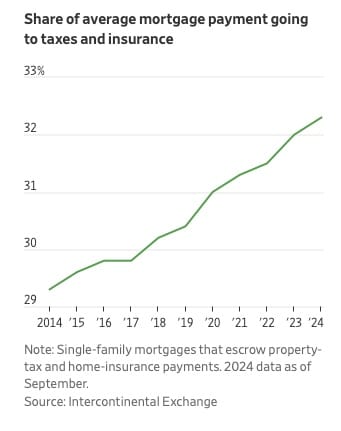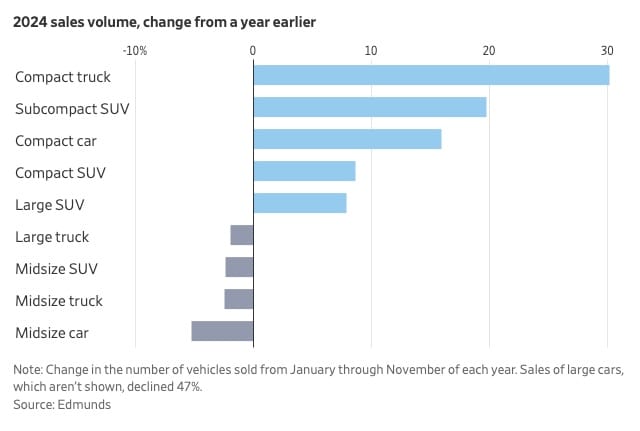December 24 2024
Insurance, taxes outpace mortgages; too-big-to-fail banks profits surge; Americans downsize car purchases; big oil bets on plastics; Trump faces Syria test; Soviets in Afghanistan

1. Insurance, Taxes Now Outpace Mortgages for Many Homeowners
2. Too-Big-To-Fail Banks Capture Record Profit Share
3. High Costs Spur U.S. Car Buyers to Downsize
4. Big Oil Bets on Plastics as Fuel Demand Shrinks
5. Trump’s ‘America First’ Faces Syria Test
Disabling app notifications
December 24, 1979: Soviet Union invades Afghanistan
GET THE APP - FREE!

See the Ad Astra Podcast! Released on Apple and Spotify around 10a CST.
We will be off tomorrow, returning Thursday December 26
1. Insurance, Taxes Now Outpace Mortgages for Many Homeowners
Soaring costs for home insurance and property taxes are busting homeowners’ budgets. Insurers have pushed big rate increases because of losses from natural disasters and rising costs to repair homes. Surging home values in recent years, meanwhile, have lifted property taxes for many homeowners. These ballooning expenses are rewriting the math of homeownership. In September, 32% of the average single-family mortgage payment went to property taxes and home insurance, the highest rate ever for data going back to 2014, according to Intercontinental Exchange. The analysis is based on borrowers who use escrow accounts to pay their taxes and insurance as part of their monthly mortgage payments. Rising taxes and insurance premiums intensify the lack of affordability home buyers already face because of record-high home prices and elevated mortgage rates. Those deterrents have led many home shoppers to give up this year, putting sales of existing homes on pace for their worst year since 1995.

Article Source: WSJ
2. Too-Big-To-Fail Banks Capture Record Profit Share
The four biggest US banks are on course to capture their largest share of the industry’s profits in almost a decade, a sign of how they are consolidating their dominant market position. JPMorgan Chase, Bank of America, Citigroup and Wells Fargo, the four largest US banks by deposits and assets, collectively reported about $88bn in profits in the first nine months of 2024, according to Financial Times calculations based on figures from industry tracker BankRegData. Together they account for 44 per cent of the US banking industry’s profits — the highest share for the first nine months of the year since 2015 — despite the pool taking in more than 4,000 of the country’s other banks. Including US Bank, PNC and Truist, the seven largest banks by deposits generated almost 56 per cent of all banking profits in the first nine months of the year, up from 48 per cent for the same period in 2023.
Article Source: FT
3. High Costs Spur U.S. Car Buyers to Downsize
Stubbornly high car prices and elevated interest rates are persuading more Americans that when it comes to their next car purchase, bigger isn’t always better. U.S. car buyers have for years gravitated to larger, roomier vehicles, a shift that had become so pronounced last decade that some automakers killed off their small-car and sedan models because of slumping sales. But with the average monthly payment for a new car soaring to new heights in recent years, some car shoppers are moving back in the other direction. Sales of some smaller, entry-level models, such as the Honda Civic and Nissan Sentra, have taken off this year, rising 23% or more through November, according to research firm Motor Intelligence. Those increases have far outpaced the industry’s growth, which has been in the low single digits this year. Meanwhile, large pickup truck sales, long a highly profitable corner of the market for the Detroit car companies, slid 1.9%, data from car-shopping website Edmunds shows. Sales of midsize SUVs, the type of vehicle typically favored by families, have also declined, falling 2.3% over 2023. This rising interest in smaller offerings comes as owning a car has become increasingly unaffordable. The average selling price of a new car is still at historically high levels, exceeding $45,000 in November, according to J.D. Power. Insurance premiums, financing rates and repair costs have also climbed in recent years, further stretching household budgets.

Article Source: WSJ
4. Big Oil Bets on Plastics as Fuel Demand Shrinks
As people switch to electric cars, or at least buy more fuel-efficient versions of traditional vehicles, energy companies will have too much oil on their hands. Transport currently accounts for over half of global oil demand. Ciarán Healy, an oil market analyst at the International Energy Agency, points out that even without a further uptick in EV sales, efficiency improvements in internal combustion engine cars mean the same amount of driving will be done with less gas in the future. The IEA thinks the world is on track to have eight million barrels a day of excess oil capacity by 2030. Energy companies hope consumers will soak up the glut through their clothing, food and electronic goods. Exxon Mobil expects demand for products that have fossil fuel-derived components and shells like “cellphones and medical supplies, as well as products necessary to preserve food and improve hygiene” to increase. London-listed BP thinks growth in petrochemicals will offset fuel declines for another decade. Today, 15.4% of global oil demand is driven by petrochemicals, according to data from Wood Mackenzie. The share is expected to rise to 19.1% by 2035 as emerging markets become wealthier and swelling middle classes spend more on synthetic clothing and do their grocery shopping at big supermarket chains, where food is more likely to be wrapped in plastic to prolong its shelf life. Advanced economies like the U.S. use up to 20 times more plastic than developing nations on a per capita basis, according to the IEA. Big Oil’s bet is that shoppers in emerging markets will close at least part of that gap. Pumping money into petrochemicals as governments are trying to solve the problem of plastic waste feels risky. Earlier this month, countries that rely on oil exports for a large share of government revenue, including Saudi Arabia and Russia, torpedoed a global treaty that proposed curbs on plastic production. But tighter regulations are in the works anyway. More than 100 countries have introduced restrictions on plastic, including a ban on single-use plastic in the European Union.
Article Source: WSJ
5. Trump’s ‘America First’ Faces Syria Test
The Assad regime’s abrupt collapse has thrust America’s long-standing military mission in Syria into uncertainty, as the Pentagon’s chief battlefield partner fights for survival and a U.S. leader skeptical of foreign military commitments prepares to retake power. President-elect Donald Trump will encounter a transformed Middle East when he begins his second term next month and increasingly urgent questions about the future for roughly 2,000 U.S. troops positioned in eastern Syria where, for more than a decade, Washington has used an array of outposts to combat the Islamic State and monitor the activities of adversary Iran. The new realities in Syria underscore the dramatic changes wrought across the region in the wake of Hamas militants’ Oct. 7, 2023, attack on Israel, which unleashed punishing wars in the Gaza Strip and Lebanon, set off unprecedented attacks between Iran and Israel, and left Tehran’s most powerful proxies severely weakened. Trump, who repeatedly threatened to pull U.S. forces from Syria during his first term and has sought in recent days to distance the United States from the upheaval now gripping the country, has not revealed his plans for the U.S. military mission there. But he and his advisers have signaled that a top priority will be containing the Islamic State, which no longer boasts the vast pseudo-state it once controlled but has regrouped in Syria’s southern desert, where U.S. forces have pounded the militants with intense airstrikes in recent days.
Article Source: WaPo
Disabling app notifications
A future app update will allow subscribing to certain notifications (e.g. McPherson news and sports). In the meantime, all notifications go to all app users. If you want to disable notifications:
iOS: Settings / Notifications then find citizen journal among the apps then uncheck “Allow Notifications”
Android: Settings / Notifications / App notifications then find citizen journal among the apps then uncheck “Allow Notifications”
Note: this turns off ALL notifications
December 24, 1979: Soviet Union invades Afghanistan
Sponsors

Sources
1. https://www.wsj.com/economy/housing/home-insurance-property-tax-vs-mortgage-cost-43ab76ed?st=5CxkEw&reflink=article_copyURL_share
2. https://on.ft.com/4iMMXP4
3. https://www.wsj.com/business/autos/after-years-of-going-big-american-car-buyers-are-downsizing-801a81b8?st=RXa1Va&reflink=article_copyURL_share
4. https://www.wsj.com/business/energy-oil/driving-an-ev-big-oil-hopes-you-dont-cut-down-on-plastic-too-f70992e0?st=dUM5jZ&reflink=article_copyURL_share
5. https://www.washingtonpost.com/national-security/2024/12/23/syria-us-troops-trump-hts-turkey/
